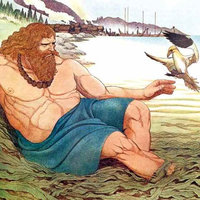
Njordr
CBUB Wins: 0
CBUB Losses: 0
CBUB Ties: 0
Win Percentage: 0%
Added by: Dinsdale Piranha
Read more about Njordr at: Wikipedia
Official Site: Public Domain
In Norse mythology, Njörðr is a god among the Vanir. Njörðr is father of the deities Freyr and Freyja by his unnamed Vanr sister, was in an ill-fated marriage with the goddess Skaði, lives in Nóatún and is associated with sea, seafaring, wind, fishing, wealth, and crop fertility.
Njörðr is attested in the Poetic Edda, compiled in the 13th century from earlier traditional sources, the Prose Edda, written in the 13th century by Snorri Sturluson, in euhemerized form as a beloved mythological early king of Sweden in Heimskringla, also written by Snorri Sturluson in the 13th century, as one of three gods invoked in the 14th century Hauksbók ring oath, and in numerous Scandinavia place names. Veneration of Njörðr survived into 18th or 19th century Norwegian folk practice, where the god is recorded as Njor and thanked for a bountiful catch of fish.
Njörðr has been the subject of an amount of scholarly discourse and theory, often connecting him with the figure of the much earlier attested Germanic goddess Nerthus, the hero Hadingus, and theorizing on his formerly more prominent place in Norse paganism due to the appearance of his name in numerous place names. Njörðr is sometimes modernly anglicized as Njord, Njoerd, or Njorth.
The name Njörðr corresponds to that of the older Germanic fertility goddess Nerthus, and both derive from the Proto-Germanic *Nerþuz. The original meaning of the name is contested, but it may be related to the Irish word nert which means "force" and "power". It has been suggested that the change of sex from the female Nerthus to the male Njörðr is due to the fact that feminine nouns with u-stems disappeared early in Germanic language while the masculine nouns with u-stems prevailed. However, other scholars hold the change to be based not on grammatical gender but on the evolution of religious beliefs; that *Nerþuz and Njörðr appear as different genders because they are to be considered separate beings. The name Njörðr may be related to the name of the Norse goddess Njörun.
CBUB Match Record:
No Regular Play Records Available
No Fantasy Draft Records Available
